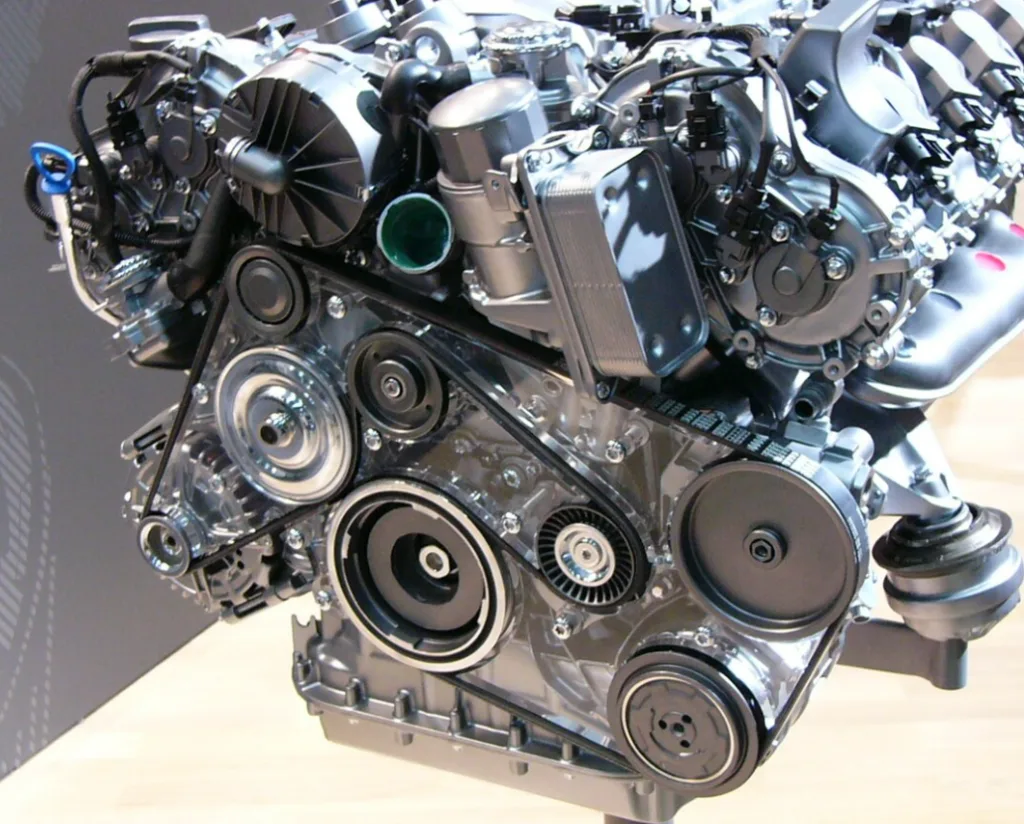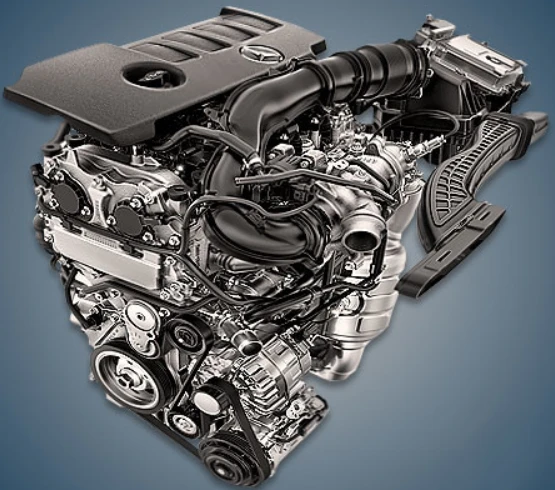As a Mercedes owner or enthusiast, you understand the allure of these luxury vehicles. However, with great power comes great responsibility – and that includes knowing which engines to avoid.
The seven Mercedes engines that you can avoid include:
- M-272 Mercedes engine
- M-273 Mercedes engine
- OM-651 Mercedes engine
- M-156 Mercedes engine
- OM-642 Mercedes engine
- M-260 Mercedes engine
- M-276 Mercedes engine
In this article, I’ll delve into 7 Mercedes engines that may cause more trouble than they’re worth, providing valuable insights to help you make informed decisions about your automotive journey. Don’t let these concealed challenges catch you off guard – read on to arm yourself with knowledge and stay ahead of the game.
1. M-272 Mercedes Engine:

The M-272 engine, a 6-cylinder powerhouse, has long been recognized for its potent power delivery and dual overhead camshaft design. It represents a high-performance option within the Mercedes lineup, boasting a naturally aspirated configuration.
Despite its initial allure, my experience with this engine has revealed a series of noteworthy drawbacks that potential buyers and current owners should be aware of.
Common Issues:
Oil Leakage:
The M-272 is plagued by a persistent issue of oil leakage. This problem extends beyond a mere inconvenience, as it not only leads to messy engine bays but also results in a distinct burning odor permeating the cabin during operation.
Identifying and addressing oil leaks become routine challenges for owners of vehicles equipped with the M-272 engine.
Fragile Manifold Lever:
Another notable concern is the fragility of the manifold lever. The plastic cover of the intake manifold, a critical component of the engine, proves to be alarmingly fragile.
Instances of breakage are frequent, causing consequential damage to the entire manifold. This vulnerability poses a significant maintenance challenge for Mercedes owners.
Thermostat Failure:
Overheating issues emerge as the M-272 engine clocks in miles. A thermostat failure, typically occurring after the vehicle surpasses the 60,000-mile mark, contributes to temperature regulation problems.
Such issues can lead to severe consequences if not promptly addressed, underscoring the importance of vigilant maintenance practices.
Impact on Mercedes Owners:
The cumulative effect of these issues transforms the M-272 engine into a less-than-ideal choice for Mercedes owners. The frequent need for repairs, coupled with the potential for significant damage, places an added burden on users.
From the inconvenience of oil leaks to the more critical risk of manifold damage, the M-272 engine demands meticulous attention and maintenance.
2. M-273 Mercedes Engine:

The V-8 M-273 engine, renowned for its impressive 5461CC displacement, represents a robust powerhouse within the Mercedes-Benz lineup.
However, my experience with this engine has unveiled significant concerns that potential buyers and current owners should be aware of. While it does deliver substantial power, it comes with a set of notable problems that demand careful consideration.
Notable Problems:
Turbocharger Failure:
The M-273 engine is susceptible to turbocharger failures, a critical component for enhancing torque at initial stages.
Unfortunately, the turbocharger’s limited lifespan becomes a noteworthy issue, often resulting in unexpected failures. This can compromise the overall performance and drivability of the vehicle.
Filter Replacement Challenges:
The delicate nature of the filters in the M-273 engine poses an additional challenge. These filters, essential for maintaining air quality and engine efficiency, are prone to choking due to dust or residue.
The need for frequent replacement at short intervals can become a recurring and costly maintenance task for owners.
Intake Manifold Issues:
The intake manifold, a crucial part of the engine’s air intake system, presents its own set of problems in the M-273.
Instances of dampers within the intake manifold crumbling in the cylinders have been reported. This can lead to engine seizure and substantial damage, emphasizing the importance of timely identification and intervention.
Maintenance Challenges for Owners:
Owning a vehicle equipped with the M-273 engine entails navigating through a series of maintenance challenges.
From the financial implications of turbocharger failures to the inconvenience of frequent filter replacements and the critical risk of intake manifold issues, owners must approach maintenance with a proactive and vigilant mindset.
3. OM-651 Mercedes Engine:

The OM-651 engine, a four-cylinder diesel powerhouse boasting a 2143 CC displacement, represents Mercedes-Benz’s foray into diesel efficiency.
Drawing from my experience with this engine, it becomes imperative to shed light on certain issues that have emerged over time. Despite its compact design and promise of fuel efficiency, the OM-651 engine has encountered challenges that warrant careful consideration.
Issues:
Compact Design Challenges:
The compact nature of the OM-651 engine, while contributing to fuel efficiency, presents challenges when it comes to repairs.
In the event of a major issue, the compact design makes it less straightforward for repairs, potentially leading to the necessity of engine replacement.
Glow Plug Concerns:
Glow plugs, essential for diesel engines during cold starts, have proven to be a point of contention with the OM-651.
Their tendency to get choked after short intervals requires servicing every 50,000 miles, becoming a recurring maintenance task for owners.
Faulty Fuel Injectors:
The initial stages of the OM-651 engine witnessed reports of faulty fuel injectors. Mercedes, recognizing the issue, undertook a comprehensive recall, replacing the problematic injectors with electromagnetic counterparts.
Despite this response, the incident raised questions about the engine’s initial reliability.
Reliability Concerns and Mercedes’ Response:
The OM-651 engine, while offering fuel efficiency, has faced reliability concerns. The compact design poses challenges for maintenance and repairs, and the recurrent issues with glow plugs and faulty fuel injectors have impacted the engine’s dependability.
Mercedes responded proactively to the injector issue with a recall, emphasizing the importance of ongoing manufacturer support.
Issue | Description |
Compact Engine | When an engine is said to be compact, it is not easy to repair. In other words, if a significant problem occurs in the OM-651, it is likely that the user would have to go for an engine replacement. |
Choked Grow Plugs | The grow plugs of the vehicle get choked after very short intervals, and they need servicing after every 50,000 miles. |
Faulty Fuel Injectors | The fuel injectors of the OM-651 were reported to be faulty at the initial stages. Due to this, Mercedes had to call back all the manufactured units and replace the fuel injectors with electromagnetic injectors. |
4. M-156 Mercedes Engine:

The M-156 engine stands as a testament to Mercedes-Benz’s pursuit of high-performance engineering, featuring dual overhead camshafts, 32 valves, and two different displacements: 6.2 and 6.3 liters. This engine, with its commendable specifications, is a driving enthusiast’s dream.
Common Problems:
Camshaft Failure:
The M-156 engine, despite its performance prowess, exhibits a vulnerability in the form of camshaft failures.
Users have reported frequent failures of this delicate component, often manifesting as a rattling noise during startup. Timely identification of such issues is imperative to prevent further damage.
Rough Idling:
Corrosion of the mounting plates in the intake manifold is a recurrent issue with the M-156 engine.
This corrosion, stemming from airflow, leads to rough idling. Consistent maintenance practices are essential to address this concern and ensure smooth engine performance.
Fuel Injector Issues:
Fuel injectors, responsible for delivering precise amounts of fuel to the engine, have been reported as problematic in the M-156 engine’s early stages.
Mercedes responded by recalling the affected units and replacing the faulty injectors with more reliable electromagnetic counterparts.
The Importance of Consistent Maintenance:
Owning a vehicle equipped with the M-156 engine demands a commitment to consistent and proactive maintenance. The performance-oriented nature of this engine requires meticulous care to ensure its longevity.
Regular inspections, timely replacements, and adherence to manufacturer-recommended service intervals are paramount for mitigating common issues and preserving the engine’s high-performance capabilities.
5. OM-642 Mercedes Engine:

The OM-642 engine, representing the final iteration of Mercedes’ diesel engines, entered the automotive scene with expectations of improved efficiency and performance.
It’s crucial to delve into certain reliability issues that potential buyers should consider. Despite its technological advancements, the OM-642 engine has encountered challenges that warrant careful examination.
Reliability Issues:
Crank Case Ventilation:
The OM-642 engine utilizes plastic crankcases, and over time, these components can succumb to the high temperatures generated by the engine.
The result is worn-out crankcase ventilation, leading to vibrations and potential engine issues. Recognizing this, I’ve observed the importance of addressing this concern promptly to avoid consequential damage.
Fuel Control Valve Dysfunction:
The fuel control valve, a critical component for regulating fuel supply, can malfunction in the OM-642 engine. This leads to decreased fuel supply to the engine, impacting overall performance.
Fragile Gaskets:
The OM-642 engine comes with gaskets of lower quality, contributing to oil leakage and spillage into the engine bay. Fragile gaskets can compromise the engine’s reliability and performance.
I’ve personally encountered the challenges posed by these gaskets, necessitating timely replacements to prevent extensive damage.
Impact on Engine Performance and Potential Consequences:
The reliability issues within the OM-642 engine collectively impact its overall performance. Worn-out crankcase ventilation can result in engine vibrations, diminishing the driving experience.
Malfunctioning fuel control valves compromise fuel supply, leading to reduced power and efficiency. Fragile gaskets contribute to oil leakage, risking damage to surrounding components and potentially leading to more severe consequences if left unaddressed.
Issue | Description |
Worn out crank case ventilation | Since the crankcases are made from plastic, after a few thousand miles, the plastic melts due to the engine's high temperature. It causes vibrations in the engine, and when experienced, it is best to change the crankcase at the earliest. |
Faulty fuel control valve | The fuel control valve can malfunction at times, which decreases the fuel supply to the engine. |
Fragile gaskets | The engine came with low-quality gaskets, and it caused the leakage and spillage of oil into the engine bay. |
6. M-260 Mercedes Engine:

The M-260 engine, a product of Mercedes’ commitment to technological advancements, embodies the latest innovations in automotive engineering.
It’s essential to explore reported problems that potential buyers should be aware of. Despite its modern features, the M-260 engine has faced challenges that demand attention and consideration.
Reported Problems:
Spark Plugs and Coils:
The M-260 engine, equipped with direct injection technology, experiences frequent issues with spark plugs and ignition coils. This is a critical concern as these components play a pivotal role in the combustion process.
I’ve encountered the demanding power delivery requirements of direct injection systems, which can lead to premature wear of spark plugs and coils.
Knocking Sound:
A common issue reported with the M-260 engine is the occurrence of knocking sounds. This problem is often attributed to the use of lower-grade fuel in the gas tank, whereas these engines necessitate premium gasoline.
Cylinder Head Failure:
The M-260 engine has been associated with instances of cylinder head failure. This component, housing both intake and exhaust valves, is critical for proper engine functioning.
Recognizing the potential consequences of such failures, it becomes imperative for owners to address these issues promptly.
Challenges Faced by Owners and Potential Solutions:
Owners of vehicles equipped with the M-260 engine may encounter challenges related to spark plugs and coils, knocking sounds, and cylinder head failure.
Proactive measures, including using premium fuel, regular maintenance, and prompt identification of issues, can mitigate these challenges. Engaging with authorized service centers and adhering to manufacturer recommendations are key aspects of ensuring the longevity and reliability of the M-260 engine.
7. M-276 Mercedes Engine:

The M276 engine series, representing an evolution from its predecessor, the M272, encompasses various versions, including a 3.5L naturally aspirated, a 3.0L twin-turbo, and a 3.5L twin-turbo variant. As someone with firsthand experience owning a Mercedes with the M276 engine, it’s crucial to delve into notable issues that have emerged.
Despite its commendable balance between performance and fuel efficiency, certain challenges demand the attention of potential buyers.
Notable Issues:
Faulty Fuel Injectors:
The M276 engine faced early challenges with faulty fuel injectors. This issue prompted Mercedes to initiate a recall, replacing the problematic injectors with more reliable electromagnetic counterparts.
Timing Chain Tensioners:
A known issue with the M276 engine involves insufficient oil flow to the secondary chain tensioners upon startup. This results in a rattling sound until the engine’s oil pressure reaches a sufficient level.
Mercedes has recommended addressing this concern by installing updated tensioner components along with check valves.
Mercedes’ Response and Recommendations for Addressing Concerns:
The manufacturer, recognizing the issues with faulty fuel injectors and timing chain tensioners in the M276 engine, demonstrated responsiveness by initiating a recall and providing recommendations for addressing these concerns.
The replacement of faulty injectors and the installation of updated tensioner components with check valves showcase the manufacturer’s commitment to customer satisfaction and long-term engine health.
Tips for Engine Maintenance in Mercedes:
Owning a Mercedes comes with the responsibility of ensuring proper care for its engine – the heart and soul of any vehicle. Here are essential tips for maintaining your engine’s health and performance.
- Frequent Oil Changes:
Regular oil changes are the lifeblood of any engine, and Mercedes is no exception. Clean oil ensures proper lubrication, reduces friction, and extends the engine’s lifespan. I’ve personally witnessed the positive impact of consistent oil changes on the overall performance and longevity of my Mercedes.
- Monitoring the Cooling System:
The cooling system plays a crucial role in regulating engine temperature. Overheating can lead to severe damage, and Mercedes engines are sensitive to fluctuations.
Regularly check coolant levels, inspect for leaks, and ensure the radiator and cooling fan function optimally. It's a practice I prioritize to prevent any temperature-related issues.
- Inspecting Engine Components:
Regular inspections of engine components, including belts, hoses, and filters, are imperative. Wear and tear on these elements can lead to performance issues and even engine failure if neglected. By proactively inspecting and replacing these components as needed, Mercedes owners can avoid major breakdowns and costly repairs.
As a Mercedes owner, I’ve learned that firsthand experience is invaluable when it comes to understanding and addressing the unique needs of these sophisticated engines. These tips aren’t just theoretical; they stem from the practical challenges and successes I’ve encountered in maintaining my own Mercedes.
In sharing these tips, my goal is to impart knowledge gained through personal experience. By adopting a proactive approach to maintenance, Mercedes owners can enjoy a smooth and reliable driving experience.
Final Thought:
While Mercedes-Benz is synonymous with luxury and innovation, it’s crucial for potential buyers to be aware of certain engine-related challenges. The nuanced issues discussed in this guide highlight the importance of informed decision-making.
By exercising caution and staying vigilant about potential concerns, buyers can navigate the vast array of Mercedes engines with confidence.
Also Read:
7 Most Reliable Mercedes Engines You Can Rely On- Details
5 Reliable Land Rover Engines You Can Surely Count On
7 Most Reliable Audi Engines You Need to Consider
7 Volvo Engine Models for Ultimate Driving Perfection
Frequently Asked Questions (FAQs):
What are the most reliable Mercedes engines in the automobile marketplace?
The most reliable Mercedes engines in the automobile marketplace are from OM categories, including OM617. These are the most reliable choices and can exceed 620,000 mileages.
What are some of the Mercedes engines that automobile freaks should avoid?
The Mercedes engine, which is problematic in nature for automobile freaks, is as follows:
- A-Class W168
- ML-Class W163
- E-Class W210
- X-Class engine
- C300 W205 engine
What C-class Mercedes engine should be avoided?
The C-class Mercedes engine, which should be avoided, includes the variant C250 from 2012-2015. It is recommended to look for the Mercedes engine from the 2021 C-class.
Did the Mercedes owners ever report the engine problems?
Yes, the Mercedes owners have reported the engine problems, including the misfiring in the engine and wearing of engine parts.
How long can the engine in a Mercedes last?
The Mercedes engine can last longer and generally cover up to 300,000 mileage.
Which class is better for Mercedes, C or E type?
The E-class Mercedes is considered the perfect one regarding performance and offers extra horsepower. On the other hand, the C-Class Mercedes provides extra fuel efficiency.

This is Surya. I am an experienced off-roader. I have been off-roading for many years across several terrains. I am passionate about 4×4 driving and want to share my knowledge and experience with others.
My goal is to provide you with the most comprehensive and unbiased information about off-roading.
I curated this article through my personal experience and expertise, and I hope it helps you with what you are looking for.

 (+91)9123743026
(+91)9123743026
 24/1 Nibedita Sarani. M.B. Road, Kolkata- 700051, India
24/1 Nibedita Sarani. M.B. Road, Kolkata- 700051, India